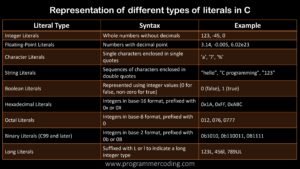What is Literals?
Literals are constant values assigned to constant variables. It can be said that the text represents a fixed value that cannot be changed. It also has a memory but no data as a change. For example const int = 10; It is an integer expression where 10 is an integer literal.
Different types of literals in C

- Integer Literals:
Integer literals are whole numbers without any fractional or exponential part.
Examples: 0, 123, -45
- Floating-Point Literals:
Floating-point literals are numbers with a fractional part.
Examples: 3.14, -0.005, 6.02e23
- Character Literals:
Character literals represent single characters enclosed within single quotes ‘.
Examples: ‘a’, ‘7’, ‘%’
- String Literals:
String literals represent sequences of characters enclosed within double quotes “.
Examples: “hello”, “programmercoding.com”, “123”
- Boolean Literals:
C does not have a built-in boolean data type, but boolean literals are often represented using integer values, where 0 represents false and any non-zero value represents true.
Examples: 0 (false), 1 (true)
- Hexadecimal Literals:
Hexadecimal literals are integers written in base-16 format, prefixed with 0x or 0X.
Examples: 0x1A, 0xFF, 0xABC
- Octal Literals:
Octal literals are integers written in base-8 format, prefixed with 0.
Examples: 012, 076, 0777
- Binary Literals (C99 and later):
Binary literals are integers written in base-2 format, prefixed with 0b or 0B.
Examples: 0b1010, 0b110011, 0B1111
- Long and Unsigned Literals:
Long literals are suffixed with L or l to indicate a long integer type.
Unsigned literals are suffixed with U or u to indicate an unsigned integer type.
Examples: 123L, 456U, 789UL
Example
#include <stdio.h>
int main() {
// Integer Literal
int intLiteral = 123;
printf(“Integer Literal: %d\n”, intLiteral); // Output: Integer Literal: 123
// Floating-Point Literal
float floatLiteral = 3.14;
printf(“Floating-Point Literal: %.2f\n”, floatLiteral); // Output: Floating-Point Literal: 3.14
// Character Literal
char charLiteral = ‘A’;
printf(“Character Literal: %c\n”, charLiteral); // Output: Character Literal: A
// String Literal
char *stringLiteral = “Hello, programmercoding.com!”;
printf(“String Literal: %s\n”, stringLiteral); // Output: String Literal: Hello, C Programming!
// Boolean Literal
int booleanLiteral = 1; // Assuming 1 represents true
printf(“Boolean Literal: %d\n”, booleanLiteral); // Output: Boolean Literal: 1
// Hexadecimal Literal
int hexLiteral = 0xFF;
printf(“Hexadecimal Literal: %#X\n”, hexLiteral); // Output: Hexadecimal Literal: 0XFF
// Octal Literal
int octalLiteral = 076;
printf(“Octal Literal: %#o\n”, octalLiteral); // Output: Octal Literal: 076
// Binary Literal (C99 and later)
int binaryLiteral = 0b1010;
printf(“Binary Literal: %#X\n”, binaryLiteral); // Output: Binary Literal: 0XA
// Long Literal
long longLiteral = 123456789L;
printf(“Long Literal: %ld\n”, longLiteral); // Output: Long Literal: 123456789
return 0;
}
Output
Integer Literal: 123
Floating-Point Literal: 3.14
Character Literal: A
String Literal: Hello, programmercoding.com!
Boolean Literal: 1
Hexadecimal Literal: 0XFF
Octal Literal: 076
Binary Literal: 0XA
Long Literal: 123456789
